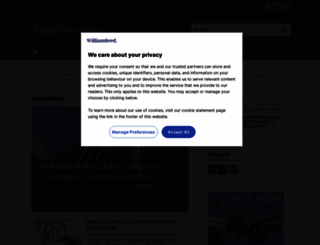Animal feed - Nutrition, additives supplements, processing
Page Load Speed
7.5 sec in total
First Response
222 ms
Resources Loaded
6.7 sec
Page Rendered
575 ms

About Website
Click here to check amazing Feed Navigator content for United States. Otherwise, check out these important facts you probably never knew about feednavigator.com
Free access to news on animal feed and animal nutrition. From feed additives to animal feed processing, we cover the animal food industry for chicken, cattle, pigs.
Visit feednavigator.comKey Findings
We analyzed Feednavigator.com page load time and found that the first response time was 222 ms and then it took 7.2 sec to load all DOM resources and completely render a web page. This is a poor result, as 80% of websites can load faster.